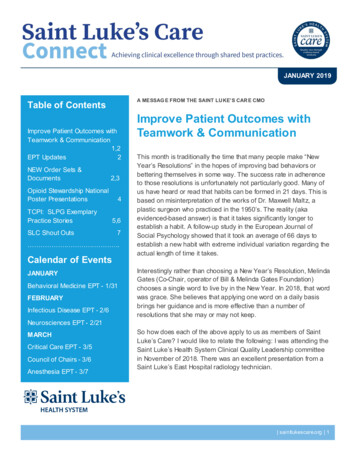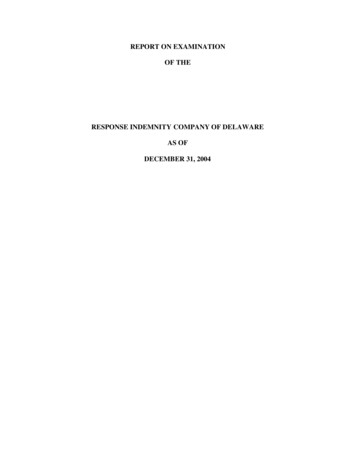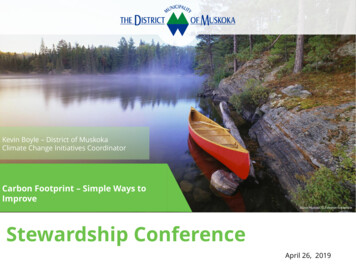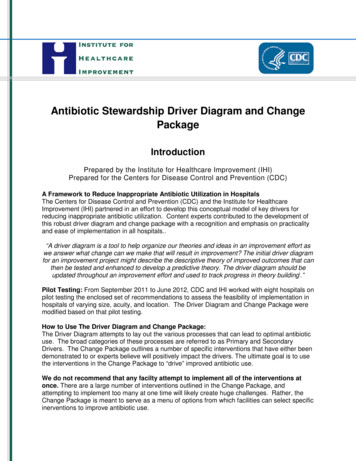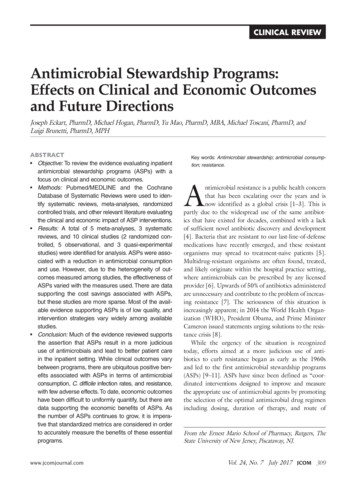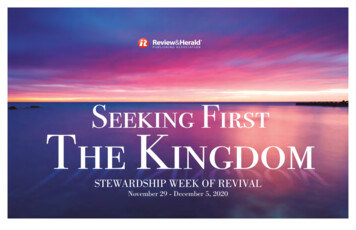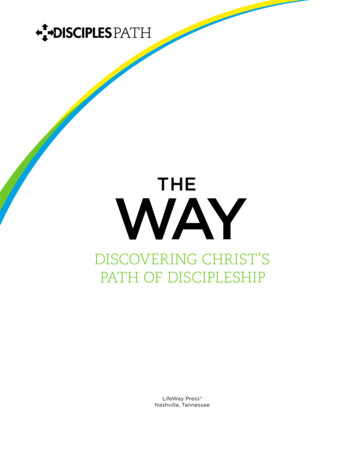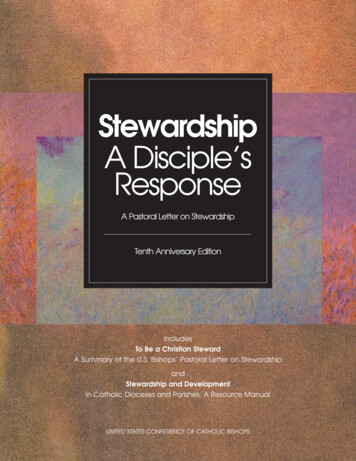
Transcription
StewardshipA Disciple’sResponseA Pastoral Letter on StewardshipTenth Anniversary EditionincludesTo Be a Christian StewardA Summary of the U.S. Bishops’ Pastoral Letter on StewardshipandStewardship and Developmentin Catholic Dioceses and Parishes: A Resource ManualUNITED STATES CONFERENCE OF CATHOLIC BISHOPS
StewardshipA Disciple’sResponseA Pastoral Letter on StewardshipTenth Anniversary EditionincludesTo Be a Christian StewardA Summary of the U.S. Bishops’ Pastoral Letter on StewardshipandStewardship and Developmentin Catholic Dioceses and Parishes: A Resource ManualUnited States Conference of Catholic BishopsWashington, D.C.
The original document Stewardship: A Disciple’s Response was developed by the Ad Hoc Committee on Stewardship of theUnited States Conference of Catholic Bishops (USCCB). It was approved by the full body of U.S. Catholic bishops at itsNovember 1992 General Meeting. The companion document Stewardship and Development in Catholic Dioceses and Parishes:A Resource Manual was developed as a resource by the Ad Hoc Committee on Stewardship in 1996. The preface to the tenthanniversary edition was approved by the full body of U.S. Catholic bishops at its November 2002 General Meeting, and thisedition has been authorized for publication by the undersigned.Msgr. William P. FayGeneral Secretary, USCCBExcerpts from Romano Guardini, The Lord (Chicago: Henry Regnery Company, 1954), 16-17, 37, 364; used with permission.Excerpts from William Reiser, SJ, An Unlikely Catechism: Some Challenges for the Creedless Christian (New York: Paulist Press,1985), 51, 161; used with permission. Excerpts from the United Church of Christ, Christian Faith: Personal Stewardship andEconomic Sharing (Eighteenth General Synod, February 20, 1991); used with permission. Excerpts from Robert N. Bellah, et al.,Habits of the Heart: Individualism and Commitment in American Life (New York: Harper and Row, 1985), 66; used with permission.Excerpts from Anwar el-Sadat, In Search of Meaning (New York: Harper and Row, 1977), 82; used with permission. Excerptsfrom Frederick Buechner, The Hungering Dark (New York: The Seabury Press, 1981), 27; used with permission. Excerpts fromJames Bacik, Contemporary Theologians (Chicago: The Thomas More Press, 1989), 237; used with permission. Excerpts fromStanley Hauerwas, A Community of Character: Toward a Constructive Christian Social Ethic (Notre Dame, Ind.: University ofNotre Dame Press 1981), 60; used with permission. Excerpts from The Documents of Vatican II, Walter M. Abbott, SJ, GeneralEditor, copyright 1966, The America Press, Inc., 106 West 56th Street, New York, N.Y, are reprinted with permission. Allrights reserved.Scripture texts used in this work are taken from the New American Bible, copyright 1991, 1986, and 1970 by the Confraternityof Christian Doctrine, Washington, D.C. 20017, and are used by permission of copyright owner. All rights reserved.Grateful acknowledgment is extended to the National Catholic Development Conference and the National CatholicStewardship Council, whose financial support has enabled this project to be undertaken.“Appendix III: Stewardship Resources” from International Catholic Stewardship Council. Used with permission. All rights reserved.In 2001 the National Conference of Catholic Bishops and United States Catholic Conference became the United StatesConference of Catholic Bishops.This book is also available in Spanish. Call 800-235-8722 and ask for pub. no. 5-883.Photo Credits: pp. 4, 7, 15, 21, 38, Reuters/CNS; p. 8, Dave Hrbacek, The Catholic Spirit/CNS; p. 24 HMS Group/CORBIS;p. 27 Ted Spiegel/CORBIS; p. 33 the master collection, family living/CORBIS; pp. 12, 18, 41, 53, Human Issues Collaborative;p. 35, Jim Whitmer photography.First Printing of this tenth anniversary edition, December 2002ISBN 1-57455-465-4Copyright 2002, United States Conference of Catholic Bishops, Inc. Washington, D.C. All rights reserved. No part of thiswork may be reproduced or transmitted in any form or by any means, electronic or mechanical, including photocopying, recording, or by any information storage and retrieval system, without permission in writing from the copyright holder.
ContentsPreface. . . . . . . . . . . . . . . . . . . . . . .1Introduction . . . .The Challenge . . . . .The Choice . . . . . .The Vision . . . . . .The Plan of the Pastoral LetterFor Reflection and Discussion. .5567810I.The Call. . . . .The Disciple’s Vocation . .Responding to the Call . .The Call to Stewardship . .The Cost of Discipleship . .For Reflection and Discussion.131314141516II. Jesus’ Way . . . . .The Example of Jesus . . .The Image of the Steward.The Steward’s Reward. .For Reflection and Discussion.1919192022III. Living as a StewardCreation and Stewardship.Collaborators in Creation.Redemption and StewardshipCooperation in RedemptionFor Reflection and Discussion.252526272829IV. Stewards of the ChurchCommunity and Stewardship. . .Evangelization and Stewardship. .Solidarity and Stewardship . . . .Eucharistic Stewardship . . . . .For Reflection and Discussion . . .313132333436The Christian Steward . . . . . . . . . . . . . .39V.Appendix ITo Be a Christian Steward: A Summary of theU.S. Bishops’ Pastoral Letter on Stewardship. . . .42Appendix IIStewardship and Development in Catholic Diocesesand Parishes: Resource Manual . . . . . . . . . . .45Appendix IIIStewardship Resources68. . . . . . . . . . . . . . .
StewardshipA Disciple’s ResponseA S EACH ONE HAS RECEIVED A GIFT,USE IT TO SERVE ONE ANOTHERAS GOOD STEWARDS OF GOD’S VARIED GRACE.(1 PT 4:10)
Preface“ONCE ONE CHOOSES TOBECOME A DISCIPLE OFmentally the work of the Spirit in our lives. When weaccept our lives as sheer gifts, the Spirit can use us asapt instruments for spreading the Gospel. Whereverthe Spirit works, there is joy. Good stewards are alwaysthe joyful bearers of the Good News of Salvation.JESUS CHRIST, STEWARDSHIPIS NOT AN OPTION.”With these words, Bishop John J. McRaith, an originalmember of the U.S. Catholic bishops’ Ad HocCommittee on Stewardship, summarized succinctlythe heart of the 1992 pastoral letter Stewardship: ADisciple’s Response. Ten years after its publication, thepastoral letter’s challenge that we embrace stewardshipas an expression of discipleship with the “power tochange how we understand and live out our lives” continues to engage lay people, religious men and women,priests, deacons, and bishops.1 This challenge is just aspowerful today as in 1992, as a new generation ofCatholics is introduced to the biblical concept of stewardship and embraces “the call to follow Jesus and imitate his way of life.”2In the words of the late Archbishop Thomas Murphy,the first chairman of the Ad Hoc Committee, “How dowe develop among ourselves, our priests, seminarians,and lay people a spirituality of giving that offers a biblical concept of stewardship?” This tenth anniversaryedition of Stewardship: A Disciple’s Response can serve asa gospel blueprint with which to develop and expandthis concept to build the kingdom of God. As with allthings pertaining to the Gospel, stewardship is funda-Much has been accomplished with stewardship as away of life in the contemporary Church. Since 1992,archdiocesan and diocesan offices and directors ofstewardship have multiplied across the nation, andevery year increasing numbers of parishes introducestewardship and the spirituality of giving. An increasinginternational attention on stewardship has raised newapproaches toward stewardship awareness. We canobserve and learn from Catholic communities indifferent countries who are eagerly implementing theconcepts of the pastoral letter in terms of their owntraditions and cultures.The stewardship pastoral letter strongly reflects thecore of the Easter message of the earliest Christiancommunity: “We have seen the Lord!” (Jn 20:25).Stewardship always starts with the personal experienceof the Risen Christ in our midst and in our hearts. It isa vocation to discipleship. The following of Christ as adisciple entails a personal response, and this call canresult in a positive impact on our faith communities.Discipleship requires the surrender of ourselves throughgrace and choice to Jesus Christ: “Mature disciplesmake a conscious, firm decision, carried out in action,to be followers of Jesus Christ no matter the cost tothemselves.”3 A disciple is both a learner and a companion of Jesus Christ, as well as one open to themovement of the Holy Spirit towards a gracious
generosity of heart. The authentic disciple regards allhe or she is and possesses as gifts and blessings andrealizes the need to share those gifts and blessings withothers for the sake of the kingdom of God. Stewardship, then, is all-encompassing. It provides aplace for the simplest individual gesture of kindnessas well as stewardship communities working for systemic justice and peace. Stewardship flowing from apersonal and communal relationship to Christ holds aparticular attraction to people. It is, ultimately, the pulland the power of the Gospel come alive in our timesand circumstances.Stewardship: A Disciple’s Response describes conversionas “committing one’s very self to the Lord.” The lettercontinues, “Stewardship is an expression of discipleship, with the power to change how we understand andlive out our lives.”4 Good stewards live with joy andgratitude for the blessings they have received—including those that have multiplied through diligence andhard work. Indeed, good stewards live in communionwith Christ and through Christ and the Spirit strive toreturn all gifts to the Father “with an increase.” Thestewardship pastoral letter spells out this giving of ourselves in its fourth section, entitled “Stewards of theChurch,” which starts with the reality of the Churchas God’s gift: “The New Covenant in and throughChrist—the reconciliation he effects between humankind and God—forms a community: the new Peopleof God, the Body of Christ, the Church.”5This pastoral letter speaks eloquently to youth, whoseidealism and energy are needed and welcome in thechallenge of stewardship. Stewardship can lead youthand young adults to a more mature understanding oftheir lives as a vocation—as a call to serve Christ andthe Church as a layperson, religious, deacon, or priest.When we accept God’s gifts gratefully, the experienceinvariably leads to new depths of discerning how theSpirit leads people to a further response to God’s call.The publication of Go and Make Disciples, the U.S.bishops’ pastoral letter on evangelization, in the sameyear as the pastoral letter on stewardship, enhancedCatholics’ understanding of the Church’s mission asincluding both evangelization and stewardship. Togetherthese two documents emphasize conversion of heart asvital to the overall mission of the Church. In the letteron evangelization, we read, “Conversion is the changeof our lives that comes about through the power of theHoly Spirit. All who accept the Gospel undergo changeas we continually put on the mind of Christ by rejecting sin and becoming more faithful disciples in hisChurch.”7 The stewardship pastoral letter affirms thesame truth: “Beginning in conversion, change of mindand heart, this commitment is expressed not in a singleaction, nor even in a number of actions over a period oftime, but in an entire way of life.”8Individuals compose collectively the Body of Christ;therefore, disciples of Jesus Christ are stewards of theChurch because stewardship is the personal responsibility of each one of the baptized. The pastoral letterquotes from St. Paul’s letter to the Corinthians: “Toeach individual the manifestation of the Spirit is givenfor some benefit (1 Cor 12:7).”6Examples of the works, services, and ministries of thegood steward enumerated in the stewardship letterinclude the following: Stewardship of collegiality and collaboration inparish life and ministriesStewardship of social justice and the work for peaceEvangelization and witness to the GospelCatechesis and faith formationParent stewardship of the domestic churchStewardship of simplicity of lifeStewardship for ecology of the globeLay witness in the marketplace and institutionsFinancial accountability in personal andparochial affairs 2
NotesStewardship: A Disciple’s Response describes and fostersthe gospel spirituality of sharing. At the beginning ofthe letter we read, “This pastoral letter recognizes theimportance of church support, including the sharing oftime, talent, and treasure. But it situates church support in its broader context—what it means to be a disciple of Jesus Christ.”9 This way of life has its centerand source of strength in the Eucharist: “The Eucharistis the great sign and agent of this expansive communion of charity. . . . Here people enjoy a unique unionwith Christ and, in him, with one another.”101See page 5 of this edition.2Ibid., 8.3Ibid., 5.4Ibid.5Ibid., 31.6Ibid.7United States Conference of Catholic Bishops, Go and MakeDisciples: A National Plan and Strategy for Catholic Evangelizationin the United States: Tenth Anniversay English and Spanish Edition(Washington, D.C.: USCCB, 2002), no. 12.Christ and the Holy Spirit lead us to the Father in ourliturgical life of praise and thanksgiving. We bring tothe Eucharist all we are and all we have shared as stewards. As the elements of bread and wine are changedinto the Body and Blood of Christ through the actionof the Spirit, we also become more deeply transformedas disciples and stewards.This pastoral letter has served as an indispensable wayto communicate a vision and extend an invitation toChristian people to “grasp the fact that they are no lessthan ‘God’s co-workers’ (1 Cor 3:9), with their own particular share in his creative, redemptive, and sanctifyingwork.”11 Everyone who has studied and acted on thisletter knows that it will continue to attract and guidecountless new co-workers to the Church’s mission.On this tenth anniversary we express gratitude to Godfor the wisdom of those who authored Stewardship: ADisciple’s Response. We thank the countless people whoas disciples have spread the concepts and gospel valuesof the pastoral letter to the daily life of the People ofGod and have provided for the needs of the Church.Bishop Sylvester D. RyanChairmanAd Hoc Committee on Stewardship 38See page 5 of this edition.9Ibid., 6.10Ibid., 34.11Ibid., 40 (italics added).
IntroductionThree convictions in particular underlie what we say inthis pastoral letter.1.2.3.Mature disciples makea conscious, firm decision,carried out in action,to be followers of Jesus Christno matter the cost to themselves.Beginning in conversion,change of mind and heart,this commitmentis expressed not in a single action,nor even in a number of actionsover a period of time,but in an entire way of life.It means committingone’s very selfto the Lord.Stewardship is an expression of discipleship,with the power to changehow we understand and live out our lives.Discipleswho practice stewardshiprecognize Godas the origin of life,the giver of freedom,the source of all they have and are and will be.They are deeply aware of the truth that“The Lord’s are the earth and its fullness;the world and those who dwell in it” (Ps 24:1).They know themselves to be recipients and caretakersof God’s many gifts.They are gratefulfor what they have receivedand eager to cultivate their giftsout of love for Godand one another.THE CHALLENGEIn some waysit may be harderto be a Christian steward todaythan at times in the past.Although religious faith is a strong forcein the lives of many Americans,our country’s dominant secular cultureoften contradicts the valuesof the Judaeo-Christian tradition.This is a culturein which destructive idualism,consumerism—exercise seductive, powerful influences.There is a strong tendencyto privatize faith,to push it to the margins of society,confining it to people’s heartsor, at best, their homes,while excluding it from the marketplace of ideaswhere social policy is formedand men and women acquire their view of lifeand its meaning.
THE CHOICEChristiansare part of this culture,influenced by itin many ways.these and countless other issuesremain vexing questions,as well asopportunities.Also,while many Catholics are generousin giving of themselvesand their resourcesto the Church,others do not respondto the needsin proportionto what they possess.The result now is a lack of resourceswhich seriously hampersthe Church’s abilityto carry out its missionand obstructspeople’s growth as disciples.In recent decadesmany Catholics in particularhave entered intothe mainstream of American society.That has beena remarkable achievement.Often, though,this process also has widenedthe “split” between faith and lifewhich Vatican II saw as one of“the more serious errorsof our age” (Gaudium et Spes, no. 43).Thus American Catholicism itselfhas taken onsome of the less attractive valuesof the secular culture.This pastoral letter recognizes the importanceof church support,including the sharing of time, talent, and treasure.But it situateschurch supportin its broader context—what it means to bea discipleof Jesus Christ.For example,although religious people often speak aboutcommunity,individualism infects the religious experienceof many persons.Parishes,dioceses,and church institutionsappear impersonal and alienatingin the eyes of many.Evangelizationis not the priority it should be.How to use people’s gifts and charisms,how to empower the laity,how to recognize the role of women,how to affirm racial, cultural, and ethnic minorities,how to overcome poverty and oppression—This alsois the contextof stewardship.Generous sharing of resources,including money,is central to its practice,and church supportis a necessary part of this.Essentially, 6
it meanshelping the Church’s missionwith money, time, and personal resources of all kinds.This sharing is not an option for Catholicswho understandwhat membership in the Church involves.It is a serious duty.It is a consequenceof the faithwhich Catholics professand celebrate.This pastoral letter initiatesa long-term, continuing processencouraging peopleto examine and interiorizestewardship’s implications.At the start of this processit is important to lay outa comprehensive view of stewardship—a vision of a sharing, generous, accountable way of liferooted in Christian discipleship—which people can take to heartand apply to the circumstancesof their lives.Concentrating on one specific obligation of stewardship,even one as important as church support,could make it harder—even impossible—for people to grasp the vision.It could implythat when the bishopsget serious about stewardship,what they really mean issimply giving money.THE VISIONJesus’ invitationto follow himis addressed to peopleof every time and condition.Here and nowit is addressed to us—Catholic citizensof a wealthy, powerful nationfacing many questionsabout its identity and rolein the waning yearsof a troubled century,members of a community of faithblessed with many humanand material resourcesyet often uncertainabout how to sustainand use them. 7
THE PLAN OF THE PASTORAL LETTERThe pastoral letter proceeds according to thefollowing plan.As bishops, we wishto present a visionthat suitsthe needs and problemsof the Church in our country todayand speaks to thosewho practice Christian stewardshipin their particular circumstances.I. The CallStewardship is part of discipleship. But Christian discipleship begins with vocation, the call to follow Jesus andimitate his way of life. The letter therefore begins withvocation. Then it presents a very general overview ofstewardship, considered in the context of discipleship,noting that people first of all are stewards of the personal vocations they receive from God. Discipleshipand the practice of stewardship constitute a way of lifethat is both privileged and challenging.What we say hereis directed to ourselvesas much as to youwho read these words.As bishops,we recognize our obligationto be models of stewardshipin all aspects of our lives.We must be stewardsin our prayer and worship,in how we fulfillour pastoral duties,in our custody of the Church’sdoctrine, spiritual resources, personnel, and funds,in our lifestyle and use of time,and even in such mattersas the attention we give topersonal health and recreation.As we ask you to respondto the challenge of stewardship,we pray that we alsowill be open to the grace to respond.We pray that the Holy Spirit, whose gracious actionconforms us to Jesus Christ and to the Church,will enlighten us all and help us to renew our commitmentas the Lord’s disciples and as stewards of his bountiful gifts. 8
II. Jesus’ WayV. The Christian StewardNext, the pastoral letter focuses more closely on theidea of stewardship, relying on the teaching and life ofJesus to probe its meaning. It considers the implicationsfor disciples of Jesus engaged in stewardship. One ofthese is that all are called to evangelize, to share theGood News with others. And what is the reward towhich good stewards can look forward? The answer isperfect fulfillment in God’s Kingdom—a kingdomalready present, real but imperfect, in this world, whichJesus’ disciples help bring to its full reality by the practice of stewardship.The letter closes with a brief portrait or profile of theChristian steward, drawn from the New Testament.In a special way, the Blessed Virgin is the model ofChristian discipleship and of the practice of Christianstewardship as it is understood here. Do we also wish tobe disciples of Jesus Christ and to live in this way?Who is a Christian disciple? One who responds toChrist’s call, follows Jesus, and shapes his or her life inimitation of Christ’s. Who is a Christian steward? Onewho receives God’s gifts gratefully, cherishes and tendsthem in a responsible and accountable manner, sharesthem in justice and love with others, and returns themwith increase to the Lord.III. Living as a StewardHaving reflected in general terms upon Christian lifeconsidered from the point of view of discipleship andstewardship, the letter turns to the content of this wayof life. It considers the content of life in relation to twohuman activities that are fundamental to the Christianvocation. The first is collaborating with God in thework of creation. The second is cooperating with Godin the work of redemption. Both lie at the very heart ofChristian stewardship in its deepest meaning.Genesis tells us that God placed the first human beingsin a garden to practice stewardship there—“to cultivateand care for it” (Gn 2:15). The world remains a kind ofgarden (or workshop, as some would prefer to say)entrusted to the care of men and women for God’sglory and the service of humankind. In its simplest yetdeepest sense, this is the Christian stewardship ofwhich the pastoral letter speaks.IV. Stewards of the ChurchThe pastoral letter next considers the communityof faith, the People of God, which is formed by theNew Covenant in and through Christ. Each memberof the Church shares in responsibility for its mission;each is called to practice stewardship of the Church.Christians also are called to look outward and to placethemselves at the service of the entire human community, especially those who are most in need. TheEucharist is both the sign and the agent of this expansive communion of charity. 9
For Reflection and Discussion1.Do you agree with the bishops’ reasons for writing and publishing a pastoralletter on stewardship?2.Were you surprised (or, perhaps, disappointed) by the bishops’ “high road”discourse on stewardship, seemingly unrelated to pressing financial problems in the contemporary Church?3.Would you add to or subtract from the bishops’ three basic convictions thatunderlie the whole pastoral letter?4.Do you agree or disagree that in our United States’ culture materialism,relativism, hedonism, individualism, consumerism, and other evil “isms” areat work and influential?5.In your life, what may be (or actually is) the major obstacle to practicingstewardship in the context of Christian discipleship?6.If you were encouraged to advise the bishops on how to be faithful stewards, what advice would you offer?7.What does the word of God say to you regarding discipleship and stewardship? Share your reflections with others.Thus should one regard us: as servants of Christ and stewards of themysteries of God. Now it is of course required of stewards that they befound trustworthy. (1 Cor 4:1-2)If a brother or sister has nothing to wear and has no food for the day,and one of you says to them, “Go in peace, keep warm, and eat well,”but you do not give them the necessities of the body, what good is it?So also faith of itself, if it does not have works, is dead. (Jas 2:15-17)The Lord replied, “Who, then, is the faithful and prudent stewardwhom the master will put in charge of his servants to distribute [the]food allowance at the proper time? Blessed is that servant whom hismaster on arrival finds doing so. Truly, I say to you, he will put him incharge of all his property.” (Lk 12:42-44) 10
8.Comment on the following passages:The disciples are not only to learn humility and fraternal love, theymust actually participate in the mystery. (Romano Guardini)But the fundamental law of discipleship is this: being-with-Jesus meanslearning to go where Jesus is. Being-with-Jesus should eventually bringus to identify with the world and the people with whom Jesus identifieshimself. (William Reiser)Being a steward means living with trust in God’s generosity and aresponsible tending of that which God has entrusted to us. It alsomeans the fair, just, and righteous sharing of resources with others.(United Church of Christ, Christian Faith: Personal Stewardship andEconomic Sharing)It is indeed an exacting discipline to try to be the Church in a culturesuch as ours. All the assumptions upon which we could rely, which wecould take for granted in other times and places, are missing. It istherefore necessary to demonstrate, in the face of cultural skepticism,what a community of loyal and committed believers is really like.(Robert N. Bellah) 11
I. The CallAs our concept of stewardship continuesto evolve after twelve years of marriage,we are grateful for the people who havechallenged us from the beginning toembrace fully Christ’s teachings. Theyweren’t always telling us the things we wanted to hear,but we feel blessed that we were able to work throughthe initial frustrations of committing the best portion ofour time, talent, and treasure to the Church. It’s difficult to separate ourselves from the demands and possessions of the world, but there’s a tremendous amountof peace that comes from every decision we make forChrist and his will for us. We can’t overstate the powerful impact the lifestyle has had on our marriage andthree children.—Tom and LaNell LillyOwensboro, KentuckyTHE DISCIPLE’S VOCATIONThe Christian vocation is essentially a call to be a disciple of Jesus. Stewardship is part of that. Even more tothe point, however, Christians are called to be goodstewards of the personal vocations they receive. Eachof us must discern, accept, and live out joyfully andgenerously the commitments, responsibilities, and rolesto which God calls him or her. The account of the calling of the first disciples, near the beginning of John’sGospel, sheds light on these matters.John the Baptist is standing with two of his disciples—Andrew and, according to tradition, the futureevangelist John—when Jesus passes by. “Behold,” Johnthe Baptist exclaims, “the Lamb of God!” Wondering atthese words, his companions follow Christ.“What are you looking for?” Jesus asks them. “Rabbi,”they say, “Where are you staying?” “Come and you willsee.” They spend the day with him, enthralled by hiswords and by the power of his personality.Deeply moved by this experience, Andrew seeks outhis brother Simon and brings him to Jesus. The Lordgreets him: “You will be called Kephas”—Rock. Thenext day, encountering Philip, Jesus tells him: “Followme.” Philip finds his friend Nathanael and, challenginghis skepticism, introduces him to the Lord. SoonNathanael too is convinced: “Rabbi, you are the Sonof God; you are the King of Israel.”This fast-paced narrative at the beginning of John’sGospel (see Jn 1:35-50) teaches a number of lessons.For our purposes, two stand out.One is the personal nature of a call from Jesus Christ.He does not summon disciples as a faceless crowdbut as unique individuals. “How do you know me?”Nathanael asks. “Before Philip called you,” Jesus answers,“I saw you under the fig tree.” He knows people’spersonal histories, their strengths and weaknesses,their destinies; he has a purpose in mind for each one.This purpose is individual vocation. “Only in theunfolding of the history of our lives and its events,”says Pope John Paul II, “is the eternal plan of Godrevealed to each of us” (Christifideles Laici, no. 58).Every human life, every personal vocation, is unique.
And yet the vocations of all Christians do have elements in common. One of these is the call to be adisciple. In fact, we might say that to be disciples—tofollow Christ and try to live his life as our own—is thecommon vocation of Christians; discipleship in thissense is Christian life.JESUS NOT ONLY CALLS PEOPLETO HIM BUT ALSO FORMS THEMAND SENDS THEM OUTIN HIS SERVICE.The other lesson that John’s narrative makes clear isthat people do not hear the Lord’s call in isolation fromone another. Other disciples help
a vocation to discipleship. The following of Christ as a disciple entails a personal response, and this call can result in a positive impact on our faith communities. Discipleship requires the surrender of ourselves through grace and choice to Jesus Christ: “Mature disciple


